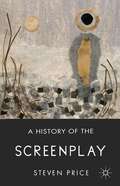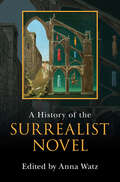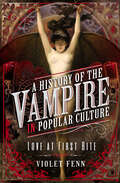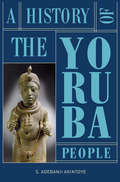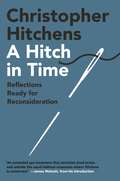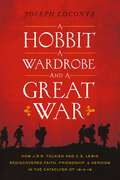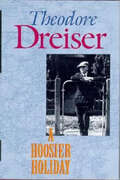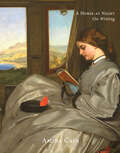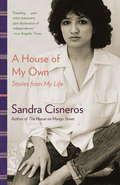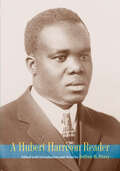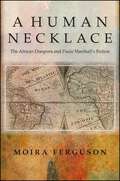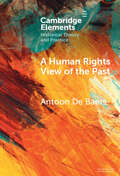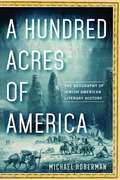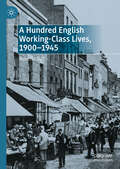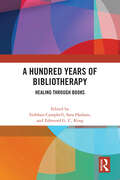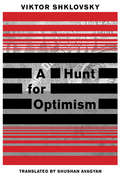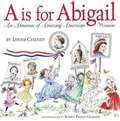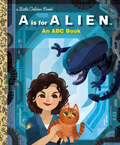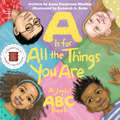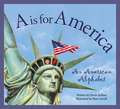- Table View
- List View
A History of the Screenplay
by Steven PriceThe screenplay is currently the focus of extensive critical re-evaluation, however, as yet there has been no comprehensive study of its historical development. International in scope and placing emphasis on the development and variety of screenplay texts themselves, this book will be an important and innovative addition to the current literature.
A History of the Surrealist Novel
by Anna WatzA History of the Surrealist Novel offers a rich, long, and elastic historiography of the surrealist novel, taking into consideration an abundance of texts previously left out of critical accounts. Its twenty thematically organized chapters examine surrealist prose texts written in French, English, Spanish, German, Greek, and Japanese, from the emergence of the surrealist movement in the 1920s and 1930s, through the post-war and postmodern periods, and up to the contemporary moment. This approach extends received narratives regarding surrealism's geographical locations and considers its transnational movement and modes of circulation. Moreover, it challenges critical biases that have defined surrealism in predominantly masculine terms, and which tie the movement to the interwar or early post-war years. This book will appeal both to scholars and students of surrealism and its legacies, modernist literature, and the history of the novel.
A History of the Vampire in Popular Culture: Love at First Bite
by Violet FennAn exploration of the continuing appeal of vampires in cultural and social history. Our enduring love of vampires—the bad boys (and girls) of paranormal fantasy—has persisted for centuries. Despite being bloodthirsty, heartless killers, vampire stories commonly carry erotic overtones that are missing from other paranormal or horror stories. Even when monstrous teeth are sinking into pale, helpless throats—especially then—vampires are sexy. But why? In A History Of The Vampire In Popular Culture, author Violet Fenn takes the reader through the history of vampires in &“fact&” and fiction, their origins in mythology and literature, and their enduring appeal on TV and film. We&’ll delve into the sexuality--and sexism--of vampire lore, as well as how modern audiences still hunger for a pair of sharp fangs in the middle of the night.
A History of the Yoruba People
by Stephen Adebanji AkintoyeA History of the Yoruba People is an audacious comprehensive exploration of the founding and growth of one of the most influential groups in Africa. In this commendable book, S. Adebanji Akintoye deploys four decades of historiography research with current interpretation and analyses to present the most complete and authoritative volume on the Yoruba to date. This exceptionally lucid account gathers and imparts a wealth of research and discourses on Yoruba studies for a wider group of readership than ever before. Very few attempts have tried to grapple fully with the historical foundations and development of a group that has contributed to shaping the way African communities are analysed from prehistoric to modern times."A wondrous achievement, a profound pioneering breakthrough, a reminder to New World historians of what 'proper history' is all about - a recount which draws the full landed and spiritual portrait of a people from its roots up - A History of the Yoruba People is yet another superlative work of brilliant chronicling and persuasive interpretation by an outstanding scholar and historiographer of Africa.~ Prof Michael Vickers, author of Ethnicity and Sub-Nationalism in Nigeria: Movement for a Mid-West Stateand Phantom Trail: Discovering Ancient America. "This book is more than a 21st century attempt to (re)present a comprehensive history of the Yoruba ... shifting the focus to a broader and more eclectic account. It is a far more nuanced, evidentially-sensitive, systematic account." ~ Wale Adebanwi, Assist. Prof., African American and African Studies, UC Davis, USA."Akintoye links the Yoruba past with the present, broadening and transcending Samuel Johnson in scope and time, and reviving both the passion and agenda that are over a century old, to reveal the long history and definable identity of a people and an ethnicity...Here is an accessible book, with the promise of being ageless, written by the only person who has sustained an academic interest in this subject for nearly half a century, providing the treasures of accumulated knowledge, robust encounters with received wisdom, and mature judgement about the future." ~ Toyin Falola, The Frances Higginbotham Nalle Professor in History, University of Texas at Austin, USA.
A Hitch in Time: Reflections Ready for Reconsideration
by Christopher Hitchens&“An extended spa treatment that stretches tired brains and unkinks the usual habitual responses where Hitchens is concerned.&” —James Wolcott in his introduction An outstanding new collection, A HITCH IN TIME is a must have for Hitchens completists and the perfect starting point for understanding one of the most brilliant essayists of all time. Anthologized here for the first time, A HITCH IN TIME is a choice selection of Christopher Hitchens&’s finest reviews, diary entries and essays - along with a smattering of ferocious letters. Familiar bêtes noires—Kennedy, Nixon, Kissinger, Clinton—rub shoulders with lesser-known preoccupations: P.G. Wodehouse, Princess Margaret and, magisterially, Isaiah Berlin. A HITCH IN TIME is a banquet of entertaining stories ranging from his thoughts on Salman Rushdie to being spanked by Margaret Thatcher in The House of Lords and the night he took his son to the Oscars. The broad scope and high caliber of Hitchens&’ essays allows his work to transcend the occasion for which it was written and continues to be essential reading. Along with an introduction by James Wolcott, A HITCH IN TIME recaptures the brilliance of Hitchens - barnstorming, cauterizing, and ultimately uncontainable.
A Hobbit, a Wardrobe, and a Great War: How J.R.R. Tolkien and C.S. Lewis Rediscovered Faith, Friendship, and Heroism in the Cataclysm of 1914-18
by Joseph Loconte<P>The untold story of how the First World War shaped the lives, faith, and writings of J. R. R. Tolkien and C. S. Lewis The First World War laid waste to a continent and permanently altered the political and religious landscape of the West. For a generation of men and women, it brought the end of innocence--and the end of faith. <P>Yet for J. R. R. Tolkien and C. S. Lewis, the Great War deepened their spiritual quest. Both men served as soldiers on the Western Front, survived the trenches, and used the experience of that conflict to ignite their Christian imagination. Had there been no Great War, there would have been noHobbit, no Lord of the Rings, no Narnia, and perhaps no conversion to Christianity by C. S. Lewis. <P>Unlike a generation of young writers who lost faith in the God of the Bible, Tolkien and Lewis produced epic stories infused with the themes of guilt and grace, sorrow and consolation. Giving an unabashedly Christian vision of hope in a world tortured by doubt and disillusionment, the two writers created works that changed the course of literature and shaped the faith of millions. This is the first book to explore their work in light of the spiritual crisis sparked by the conflict. <P><b>A New York Times Bestseller</b>
A Home for Moles
by Cindy Peattie Lei Ling Joan CzernichowskaTitle contained within StartUp Phonic Core Program. Not Sold Separately
A Hoosier Holiday
by Theodore Dreiser“Theodore Dreiser, road warrior . . . Dreiser’s account of his homecoming will touch a familiar and responsive chord in anyone who has undertaken one.” —The Washington Post Book WorldBy 1914, Theodore Dreiser was a successful writer living in New York. He had not been back to his home state in over twenty years. When his friend Franklin Booth approached him with the idea of driving from New York to Indiana, Dreiser’s response to Booth was immediate: “All my life I’ve been thinking of making a return trip to Indiana and writing a book about it.” Along the route, Dreiser recorded his impressions of the people and land in words while his traveling companion sketched some of these scenes. In this reflective tale, Dreiser and Booth cross four states to arrive at Indiana and the sites and memories of Dreiser’s early life in Terre Haute, Sullivan, Evansville, Warsaw, and his one year at Indiana University.“Because [the book] provides a portrait of the artist as a young man and describes the nation as a mosaic of individual cultures, Dreiser’s journey offers several different lessons. Part travelogue, part autobiography, part collection of essays, A Hoosier Holiday lays out the landscape of a nation that ceased to exist once the highway unfurled across the map.” —Publishers Weekly (starred review)“Though far from the author’s usual musings, this is actually a forerunner to the American road novel and very well could have been one of the inspirations for Jack Kerouac . . . this is a fine addition to public and academic libraries.” —Library Journal
A Horse at Night: On Writing
by Amina Cain&“A Horse at Night is like light from a candle in the evening: intimate, pleasurable, full of wonder. It asks us to consider fiction as life and life as fiction. Amina Cain is our generous, gentle guide through an exquisite library. A truly beautiful book.&” —Ayşegül Savaş&“I adore her work, and sensibility,&” writes Claire-Louise Bennett of Amina Cain; and Jenny Offill: &“Cain writes beautiful precise sentences about what it means to wander through this luminous world.&” Cain&’s unique wandering sensibility, her attention to the small and the surprising, finds a profound new expression in her first nonfiction book, a sustained meditation on writers and their work. Driven by primary questions of authenticity and freedom in the shadow of ecological and social collapse, Cain moves associatively through a personal canon of authors— including Marguerite Duras, Elena Ferrante, Renee Gladman, and Virginia Woolf— and topics as timely and various as female friendships, zazen meditation, neighborhood coyotes, landscape painting, book titles, and the politics of excess. A Horse at Night: On Writing is an intimate reckoning with the contemporary moment, and a quietly brilliant contribution to the lineage of Woolf&’s A Room of One&’s Own or Gass&’s On Being Blue, books that are virtuosic arguments for—and beautiful demonstrations of—the essential unity of writing and life.
A House of My Own
by Sandra CisnerosFrom the author of The House on Mango Street, a richly illustrated compilation of true stories and nonfiction pieces that, taken together, form a jigsaw autobiography--an intimate album of a beloved literary legend. From the Chicago neighborhoods where she grew up and set her groundbreaking The House on Mango Street to her abode in Mexico in a region where "my ancestors lived for centuries," the places Sandra Cisneros has lived have provided inspiration for her now-classic works of fiction and poetry. But a house of her own, where she could truly take root, has eluded her. With this collection--spanning three decades, and including never-before-published work--Cisneros has come home at last. Ranging from the private (her parents' loving and tempestuous marriage) to the political (a rallying cry for one woman's liberty in Sarajevo) to the literary (a tribute to Marguerite Duras), and written with her trademark lyricism, these signature pieces recall transformative memories as well as reveal her defining artistic and intellectual influences. Poignant, honest, deeply moving, this is an exuberant celebration of a life in writing lived to the fullest.From the Hardcover edition.
A House of My Own: Stories from My Life
by Sandra CisnerosFrom the author of The House on Mango Street, a richly illustrated compilation of true stories and nonfiction pieces that, taken together, form a jigsaw autobiography--an intimate album of a beloved literary legend. From the Chicago neighborhoods where she grew up and set her groundbreaking The House on Mango Street to her abode in Mexico in a region where "my ancestors lived for centuries," the places Sandra Cisneros has lived have provided inspiration for her now-classic works of fiction and poetry. But a house of her own, where she could truly take root, has eluded her. With this collection--spanning three decades, and including never-before-published work--Cisneros has come home at last. Ranging from the private (her parents' loving and tempestuous marriage) to the political (a rallying cry for one woman's liberty in Sarajevo) to the literary (a tribute to Marguerite Duras), and written with her trademark lyricism, these signature pieces recall transformative memories as well as reveal her defining artistic and intellectual influences. Poignant, honest, deeply moving, this is an exuberant celebration of a life in writing lived to the fullest.From the Hardcover edition.
A Hubert Harrison Reader
by Hubert HarrisonThis volume &“fill[s] a gap in our understanding of black radical and nationalist writings [and] will . . . change the way . . . we tend to look at black thought.&” —Ernest Allen, Jr., W.E.B. DuBois Department of Afro-American Studies, University of Massachusetts at Amherst The brilliant writer, orator, educator, critic, and activist Hubert Harrison (1883–1927) is one of the truly important, yet neglected, figures of early twentieth-century America. Known as &“the father of Harlem radicalism,&” and a leading Socialist party speaker who advocated that socialists champion the cause of the Negro as a revolutionary doctrine, Harrison had an important influence on a generation of race and class radicals, including Marcus Garvey and A. Philip Randolph. Harrison envisioned a socialism that had special appeal to African-Americans, and he affirmed the duty of socialists to oppose race-based oppression. Despite high praise from his contemporaries, Harrison's legacy has largely been neglected. This reader redresses the imbalance; Harrison's essays, editorials, reviews, letters, and diary entries offer a profound, and often unique, analysis of issues, events and individuals of early twentieth-century America. His writings also provide critical insights and counterpoints to the thinking of W. E. B. DuBois, Booker T. Washington and Marcus Garvey. The reader is organized thematically to highlight Harrison's contributions to the debates on race, class, culture, and politics of his time. The writings span Harrison's career and the evolution of his thought, and include extensive political writings, editorials, meditations, reviews of theater and poetry, and deeply evocative social commentary. &“Jeff Perry&’s new book on Hubert Harrison's writings and speeches is a timely addition to the scholarship on early Black radicals and on the Harlem Renaissance period. . . . [A] must read.&” —Portia James, Anacostia Museum
A Human Necklace: The African Diaspora and Paule Marshall's Fiction
by Moira FergusonFrom Brown Girl, Brownstones (1959) to The Fisher King (2000), Paule Marshall's novels, novellas, and short stories include a rich cast of unforgettable men, women, and children who forge spiritual as well as emotional and geographical paths toward their ancestors. In this, the first critical study to address all of Marshall's fiction, Moira Ferguson argues that Marshall's work collectively constitutes a multigenerational saga of the African diaspora across centuries and continents. In creating a space for her characters' interrupted lives and those of their elders and ancestors, Ferguson argues, Marshall trains a spotlight on slavery's wake and engages her fiction in the service of healing deep global wounds.
A Human Rights View of the Past (Elements in Historical Theory and Practice)
by Antoon De BaetsThe idea of human rights has been much criticized from a historical perspective but curiously enough its theoretical and practical contributions to the study of time, memory, and history have never been systematically explored. How is it to look at the past from a human rights perspective? How can historical writing benefit from applying human rights logic? In tackling these questions, the book first clarifies what a human rights view of the past is. The constituent dimensions of the past – time, memory, and history – are then reviewed, indicating what a human rights perspective can add to the study of each. Finally, the benefits accruing from a human rights view of the past to historical theory and practice are highlighted.
A Hundred Acres of America: The Geography of Jewish American Literary History
by Michael HobermanJewish writers have long had a sense of place in the United States, and interpretations of American geography have appeared in Jewish American literature from the colonial era forward. But troublingly, scholarship on Jewish American literary history often limits itself to an immigrant model, situating the Jewish American literary canon firmly and inescapably among the immigrant authors and early environments of the early twentieth century. In A Hundred Acres of America, Michael Hoberman combines literary history and geography to restore Jewish American writers to their roles as critical members of the American literary landscape from the 1850s to the present, and to argue that Jewish history, American literary history, and the inhabitation of American geography are, and always have been, contiguous entities.
A Hundred English Working-Class Lives, 1900-1945
by Rebecca BallStanley Rice, born in London in 1905, began his autobiography by stating that his life was ‘an ordinary average life with all its ups and downs’. Stanley may have described his life as ordinary, and yet he lived through a period of rapid social change, including two world wars. Despite this, Stanley assumed that his life story would be of little interest to most readers, as he had not achieved great fame or any notable accolades. This book argues that this is exactly why historians should focus on such life stories, as there is much to be gained by focusing on memories of ‘ordinary average lives’, as they can expand our knowledge of the past, often revealing firsthand experiences that have been excluded from the historical record. This book does not intend to be a general social history of the working class. Rather, it is a work of memory, drawing upon a microhistory methodology to examine how a sample of one hundred working-class autobiographers remembered and wrote about living through years that were punctuated by two worldwide conflicts and a global economic depression.
A Hundred Years of Bibliotherapy: Healing through Books
byThe First World War gave new and vital impetus to the ancient idea that books could heal. This interdisciplinary collection provides a targeted survey of 100 years of historical and contemporary understandings and practices of ‘the book as cure’.The contributors explore the curative practices of wartime reading, how they were developed and institutionalized after the war, and the afterlives of these ideas and practices today. Divided into three sections, the first considers bibliotherapy in World War I.’ It is rooted in the wartime cultures which ensured bibliotherapy became part of the active treatment of soldiers’ damaged minds and bodies on both sides of the Atlantic after 1914. Parts two and three examine the expanding variety of critical contexts, both historical and more modern, in which reading and wellbeing continued to intersect. The chapters draw on a wide range of source material from trench magazines to autograph books to e-novels, as well as on data and information drawn from practice-based encounters. They also provide the basis for further scholarly exploration of, for example, national traditions and contexts and the inter-disciplinary relationships which they inspire.A Hundred Years of Bibliotherapy: Healing through Books provides the first interdisciplinary dialogue on and account of bibliotherapy, addressing both historical and present-day modes of engaging with the ostensibly curative power of reading and reading cultures. It is an invaluable resource for scholars of literary studies, book history, and the medical humanities.
A Hunt for Optimism
by Viktor Shklovsky Shushan AvagyanBegun in 1929 under the title "New Prose," and drastically revised after Vladimir Mayakovsky's sudden death, A Hunt for Optimism (1931) circles obsessively around a single scene of interrogation in which a writer is subjected to a show trial for his unorthodoxy. Using multiple perspectives, fragments, and aphorisms, and bearing the vulnerability of both the Russian Jewry and the anti-Bolshevik intelligentsia--who had unwittingly become the "enemies of the people"--Hunt satirizes Soviet censorship and the ineptitude of Soviet leaders with acerbic panache. Despite criticism at the time that it lacked unity and was too "variegated" to be called a purely "Shklovskian book," Hunt is stylistically unpredictable, experimentally bold, and unapologetically ironic--making it one of the finest books in Shklovsky's body of work.
A Hunt for Optimism
by Viktor Shklovsky Shushan AvagyanBegun in 1929 under the title "New Prose," and drastically revised after Vladimir Mayakovsky's sudden death, A Hunt for Optimism (1931) circles obsessively around a single scene of interrogation in which a writer is subjected to a show trial for his unorthodoxy. Using multiple perspectives, fragments, and aphorisms, and bearing the vulnerability of both the Russian Jewry and the anti-Bolshevik intelligentsia--who had unwittingly become the "enemies of the people"--Hunt satirizes Soviet censorship and the ineptitude of Soviet leaders with acerbic panache. Despite criticism at the time that it lacked unity and was too "variegated" to be called a purely "Shklovskian book," Hunt is stylistically unpredictable, experimentally bold, and unapologetically ironic--making it one of the finest books in Shklovsky's body of work.
A Is For Abigail: An Almanac Of Amazing American Women
by Lynne Cheney Robin Preiss GlasserLynne Cheney and Robin Preiss Glasser collaborated on America: A Patriotic Primer, which captured the imagination of American children and became a national best-seller. Now they turn their hands to A is for Abigail: An Almanac of Amazing American Women and bring the great women of American history to life. Filled to the brim with words and pictures that celebrate the remarkable (although often unmarked) achievements of American women, this is a book to relish and to read again and again. <p><p> Mothers, daughters, schoolchildren, generations of families -- everyone -- will take Abigail Adams's words to heart and "remember the ladies" once they read the stories of these astonishing, astounding, amazing American women.
A Is for Africa
by Ifeoma Onyefulu"This alphabet is based on my own favorite images of the Africa I know. I come from the Igbo tribe and grew up in southeastern Nigeria. It was in Nigeria that these photographs were taken, but the people and things pictured reflect the rich diversity of the continent as a whole. There are examples of Moslem and Arabic influences from the north of my country, as well as costumes and ornaments from the south where the religions are animist or Christian. These religions are found in other African countries, too. There are kola nuts, indigo, and beaded jewelry and the ways in which Nigerians use them. And though other Africans may use a different kind of nut, a different color dye, and jewelry that looks different, the meanings and customs associated with them are the same. I wanted to capture what the people of Africa have in common: traditional village life, warm family ties, and above all, the hospitality for which Africans are famous. This book shows what Africa is to me, but it is for and about all the peoples of this vast, friendly, colorful continent." Other books by Ifeoma Onyefulu are available in this library.
A Is for Alien: An ABC Book (Little Golden Book)
by Charles GouldIn space no one can hear you giggle as you read this Little Golden Book for all ages featuring the characters from the classic movie Alien!Follow Ripley and the rest of the Nostromo crew on a space adventure that introduces the alphabet from A to Z. With fun illustrations, this light-hearted reimagining of the iconic movie Alien will delight fans young and old, as well as Little Golden Book collectors throught the universe.Since 1979, Alien has been an iconic franchise that has thrilled viewers around the world.Little Golden Books enjoy nearly 100% consumer recognition. They feature beloved classics, hot licenses, and new original stories . . . the classics of tomorrow.
A Is for All the Things You Are: A Joyful ABC Book
by Nat'l Mus Afr Am Hist Culture Anna Forgerson HindleyAn ABC book celebrating and inspiring diversityA Is for All the Things You Are: A Joyful ABC Book is an alphabet board book developed by the National Museum of African American History and Culture that celebrates what makes us unique as individuals and connects us as humans. This lively and colorful book introduces young readers, from infants to age seven, to twenty-six key traits they can explore and cultivate as they grow. Each letter offers a description of the trait, a question inviting the reader to examine how he or she experiences it in daily life, and lively illustrations. The book supports understanding and development of each child's healthy racial identity, the joy of human diversity and inclusion, a sense of justice, and children's capacity to act for their own and others' fair treatment.
A Is for Aloha: A Hawai'i Alphabet
by U'Ilani GoldsberryThe landscape of Hawai'i is as rich and exotic as its history and residents. A Is for Aloha: A Hawai'i Alphabet offers readers of all ages a guided A-Z tour through this fascinating state. From the meaning of the word "aloha" to the plight of the state bird, the néné, to the sparkling beaches on the island of O'ahu, author U'ilani Goldsberry welcomes all "malihinis" (newcomers) to this lush multi-island paradise. Spectacular paintings from artist Tammy Yee bring the text to vivid life. Beginning readers will enjoy the simple rhymes while older children discover facts about each topic letter in the sidebar expository. Aloha is our letter A. It means so many things: hello, good-bye, and love to you. Fair wishes this word brings. Travelers young and old will enjoy this fact-filled guide to one of the most-visited places on earth! The book includes a quiz about Hawai'i and a pronunciation key of Hawaiian words and their meanings. Check the Bookshare collection for several more alphabet books about other states including B is for Buckeye.
A Is for America: An American Alphabet
by Devin ScillianFrom the British and our Constitution that replaced their rule, to Yellowstone and Zane Grey's stories of the west, A is for America is a sweeping tribute to all we know and love about our country. Other alphabet books filled with fun facts include: B is for Buckeye: An Ohio Alphabet, L is for Lincoln: An Illinois Alphabet, L is for Lobster: A Maine Alphabet, M is for Maple: A Canadian Alphabet, M is for Mitten: A Michigan Alphabet, S is for Sunshine: A Florida Alphabet, and V is for Volunteer: A Tennessee Alphabet. More states coming soon! It is indeed important, how America came to be. It's the idea that an individual can insist on being free. And I is for immigration and the immigrants who came from Italy, Ireland or India, we're Americans all the same. With delightful poems that beg to be read aloud, and expository text to broaden reader's reader's horizons, this American alphabet will make you fall in love with the United States over and over again. The letter X should remind us of the importance of election day, when all Americans rich and poor are allowed to have their say. Some were told they couldn't vote if they couldn't write their name. So they signed the ballot with a letter X and it counted just the same. Bright, beautifully detailed illustrations from California artist Pam Carroll bring each letter to vibrant life, from eagles and Thomas Edison to the veterans of two world wars. Celebrate all that is Americana with A is for America: An American Alphabet.
